When finding the right words to describe social interactions, a “meet and greet” can truly make a difference in personal, professional, or networking contexts. The term is widely understood, but using alternatives allows you to convey a sense of warmth, personalization, and intentionality. Whether you’re organizing an event, introducing colleagues, or hosting clients, these 35 alternatives help your messages feel more inviting and meaningful.
Finding the right words to describe social interactions like a “meet and greet” can make all the difference in personal, professional, or networking contexts. While the term itself is widely understood, using alternatives allows you to convey a sense of warmth, personalization, and intentionality. Whether you’re organizing an event, introducing colleagues, or hosting clients, these 35 alternatives will help your messages feel more inviting and meaningful.
Using thoughtful words can turn a “meet and greet” into a memorable experience. By choosing phrases deliberately, you create personal and professional connections that convey authenticity and engagement, making each interaction feel warm, sincere, and carefully curated for everyone involved.
What Does “Meet and Greet” Mean?
A “meet and greet” refers to an organized event or casual interaction where people are introduced to each other. It emphasizes connection, networking, and relationship-building, whether in social, professional, or informal settings.
When to Use “Meet and Greet”
- Networking events, professional gatherings, or conferences
- Informal introductions between new colleagues or team members
- Social events where guests are expected to mingle
Is It Professional/Polite to Say “Meet and Greet”?
Yes. It is widely accepted in professional, social, and formal contexts. However, in more formal written communication, alternative phrases may convey the purpose more clearly or sound more polished.
Pros and Cons
Pros:
- Clear, concise, and widely understood
- Conveys a sense of casual networking or introduction
- Suitable for both professional and informal contexts
Cons:
- It may sound too casual in highly formal settings
- Overuse can make invitations feel generic
- Alternatives may better convey purpose or tone
Meet and Greet Synonyms:
- Networking Session
- Introduction Event
- Welcome Gathering
- Reception
- Orientation Meet
- Social Mixer
- Meet-Up
- Coffee Chat
- Informal Gathering
- Kickoff Event
- Get-Together
- Networking Brunch
- Team Introduction
- Orientation Session
- Reception Line
- Social Hour
- Community Meet
- Icebreaker Event
- Meet-Up
- Welcome Reception
- Introduction Round
- Networking Event
- Informal Introduction
- Orientation Meet
- Casual Gathering
- Meet and Connect
- Social Gathering
- Welcome Meet
- Opening Reception
- Mingling Session
- Introduction Meet
- Icebreaker Meet
- Social Introduction
- Welcome Assembly
- Gathering of Introductions
Networking Session
Meaning:
A structured event where people connect professionally.
Explanation:
Emphasizes business relationships and professional introductions.
Example:
“Join us for a networking session with industry leaders.”
Best Use:
Professional conferences, business events
Worst Use:
Informal or casual social gatherings
Tone:
Professional, purposeful, engaging
Introduction Event
Meaning:
A gathering meant for introducing new people to each other.
Explanation:
Highlights the primary goal of connecting individuals.
Example:
“We are hosting an introduction event for the new team members.”
Best Use:
Company onboarding, school orientation
Worst Use:
Casual meetups may sound too formal.
Tone:
Polished, clear, welcoming
Welcome Gathering
Meaning:
An event designed to welcome new participants or members.
Explanation:
Focuses on hospitality and friendly reception.
Example:
“Join us for a welcome gathering for our new volunteers.”
Best Use:
Informal to semi-formal social or workplace events
Worst Use:
Strictly professional networking events
Tone:
Friendly, inviting, warm
Reception
Meaning:
A formal or semi-formal event to meet and connect with guests.
Explanation:
Often used in corporate, academic, or celebratory contexts.
Example:
“The university is hosting a reception for incoming students.”
Best Use:
Formal professional, academic, or ceremonial settings
Worst Use:
Casual gatherings or small introductions
Tone:
Formal, polite, welcoming
Orientation Meet
Meaning:
A first-time introduction session for new members or employees.
Explanation:
Helps newcomers get acquainted and build relationships.
Example:
“The orientation meeting will introduce new hires to their teams.”
Best Use:
Employee onboarding, student programs
Worst Use:
General networking events with mixed participants
Tone:
Informative, structured, friendly
Social Mixer
Meaning:
A casual social event for meeting and mingling.
Explanation:
Emphasizes informal interaction and light networking.
Example:
“Join the Friday social mixer to meet other creatives in the industry.”
Best Use:
Informal networking, community events
Worst Use:
Formal professional settings
Tone:
Casual, fun, inviting
Meet-Up
Meaning:
An informal gathering designed for people to meet and interact.
Explanation:
Commonly used in social clubs, hobby groups, or community organizations.
Example:
“We are hosting a meet-up for local writers this weekend.”
Best Use:
Informal social, interest-based events
Worst Use:
Highly formal professional networking
Tone:
Casual, friendly, approachable
Coffee Chat
Meaning:
A small, informal meeting to connect and converse.
Explanation:
Often used for professional networking in a casual setting.
Example:
“Schedule a coffee chat with your mentor to discuss career goals.”
Best Use:
Professional one-on-one or small group introductions
Worst Use:
Large-scale events may feel too casual.
Tone:
Friendly, professional, approachable
Informal Gathering
Meaning:
A casual event to bring people together for introductions.
Explanation:
Flexible, suitable for small or large groups, and emphasizes friendliness.
Example:
“The informal gathering on Friday will let everyone meet the new interns.”
Best Use:
Workplace or community events, casual social events
Worst Use:
Formal or ceremonial events
Tone:
Casual, welcoming, friendly
Kickoff Event
Meaning:
A launch event that introduces participants and sets the tone.
Explanation:
Commonly used for programs, projects, or campaigns.
Example:
Attend the project kickoff event to meet your new teammates.”
Best Use:
Professional or organizational launches
Worst Use:
Purely social or casual meetups
Tone:
Energizing, professional, purposeful
Get-Together
Meaning:
A casual gathering for people to connect and socialize.
Explanation:
Often informal, emphasizing friendliness and comfort.
Example:
“We’re hosting a weekend get-together for all new club members.”
Best Use:
Informal social events, community gatherings
Worst Use:
Formal professional networking events
Tone:
Casual, friendly, welcoming
Networking Brunch
Meaning:
A social or professional gathering over breakfast or brunch for networking.
Explanation:
Combines casual dining with the purpose of meeting and connecting.
Example:
Join us for a networking brunch with industry leaders this Saturday.”
Best Use:
Professional networking, semi-formal social events
Worst Use:
Formal dinners or ceremonial events
Tone:
Friendly, professional, approachable
Team Introduction
Meaning:
A session to introduce new team members to the existing team.
Explanation:
Focuses on workplace or organizational integration.
Example:
“The HR department has scheduled a team introduction for the new hires.”
Best Use:
Workplace onboarding, departmental meetings
Worst Use:
Casual social events
Tone:
Professional, clear, welcoming
Orientation Session
Meaning:
An organized event to introduce newcomers to a program or organization.
Explanation:
Structured to provide information while encouraging initial connections.
Example:
“The orientation session will introduce students to faculty and peers.”
Best Use:
Academic or corporate onboarding programs
Worst Use:
Casual, informal gatherings
Tone:
Informative, structured, professional
Reception Line
Meaning:
A formal arrangement where guests meet and are greeted individually.
Explanation:
Traditional in ceremonies or formal events for personal interaction.
Example:
Guests will meet the hosts at the reception line after the ceremony.”
Best Use:
Weddings, award ceremonies, formal galas
Worst Use:
Informal events or casual gatherings
Tone:
Formal, polite, welcoming
Social Hour
Meaning:
A designated time for informal mingling and introductions.
Explanation:
Common in professional or networking events with light refreshments.
Example:
“Join us for a social hour to meet other conference attendees.”
Best Use:
Professional networking, semi-formal gatherings
Worst Use:
Formal ceremonies or official meetings
Tone:
Casual-professional, friendly, approachable
Community Meet
Meaning:
A gathering for community members to connect and socialize.
Explanation:
Emphasizes inclusivity, interaction, and relationship-building.
Example:
“The community meeting is scheduled for Saturday to welcome new residents.”
Best Use:
Neighborhood events, clubs, and hobby groups
Worst Use:
Strictly professional corporate meetings
Tone:
Friendly, inviting, communal
Icebreaker Event
Meaning:
A gathering focused on introductions and easing participants into interaction.
Explanation:
Uses activities to help people meet and feel comfortable.
Example:
“The workshop begins with an icebreaker event for all attendees.”
Best Use:
Workshops, training sessions, team-building events
Worst Use:
Large formal ceremonies without interactive components
Tone:
Fun, engaging, friendly
Meet-Up
Meaning:
An informal gathering where people connect around a shared interest or purpose.
Explanation:
Flexible, often casual, and widely used for social and professional purposes.
Example:
“The photography club is hosting a weekend meet-up at the park.”
Best Use:
Casual clubs, interest groups, informal networking
Worst Use:
Highly formal professional events
Tone:
Casual, approachable, friendly
Welcome Reception
Meaning:
A formal or semi-formal event to welcome newcomers or guests.
Explanation:
Focuses on hospitality and creating a positive first impression.
Example:
Attend the welcome reception for new employees at 5 PM.”
Best Use:
Corporate onboarding, ceremonial events, and academic gatherings
Worst Use:
Casual, small-scale, informal gatherings
Tone:
Polished, warm, inviting
Introduction Round
Meaning:
A structured way to introduce participants one by one.
Explanation:
Often used in workshops, meetings, or classrooms.
Example:
Let’s start with an introduction round so everyone knows each other.”
Best Use:
Professional or educational sessions
Worst Use:
Large casual parties
Tone:
Formal, organized, clear
Networking Event
Meaning:
A gathering specifically designed for building professional connections.
Explanation:
Emphasizes career or business networking and opportunity.
Example:
“The annual networking event brings together industry professionals.”
Best Use:
Conferences, trade shows, professional meetups
Worst Use:
Casual social hangouts
Tone:
Professional, purposeful, engaging
Informal Introduction
Meaning:
Casual initial meeting to get acquainted.
Explanation:
Friendly and flexible, emphasizing comfort over structure.
Example:
We’ll have an informal introduction with the new team members over lunch.”
Best Use:
Casual work or community settings
Worst Use:
Formal or ceremonial introductions
Tone:
Relaxed, approachable, friendly
Orientation Meet
Meaning:
Introduces newcomers in a structured orientation format.
Explanation:
Often combines information-sharing with social interaction.
Example:
“The orientation meeting for interns is scheduled for Monday morning.”
Best Use:
Academic or corporate onboarding
Worst Use:
Purely social gatherings
Tone:
Structured, informative, welcoming
Casual Gathering
Meaning:
A low-pressure event to bring people together informally.
Explanation:
Encourages interaction without formality.
Example:
“Join our casual gathering to meet new neighbors.”
Best Use:
Community or workplace social events
Worst Use:
Formal business meetings
Tone:
Friendly, informal, approachable
Meet and Connect
Meaning:
Focuses on both introduction and building relationships.
Explanation:
Highlights networking and meaningful interaction.
Example:
The seminar includes a session to meet and connect with attendees.”
Best Use:
Professional conferences, workshops
Worst Use:
Casual hangouts may sound too formal.
Tone:
Professional, engaging, purposeful
Social Gathering
Meaning:
General event for people to interact socially.
Explanation:
Flexible term for various casual to semi-formal events.
Example:
“The social gathering will introduce members of the volunteer group.”
Best Use:
Clubs, hobby groups, informal social events
Worst Use:
Strictly professional networking
Tone:
Friendly, casual, inviting
Welcome Meet
Meaning:
A simple gathering to greet and welcome newcomers.
Explanation:
Informal to semi-formal; emphasizes hospitality.
Example:
“The welcome meet will help new students get acquainted.”
Best Use:
Schools, workplaces, clubs
Worst Use:
Formal ceremonies
Tone:
Warm, inviting, friendly
Opening Reception
Meaning:
An official start to an event with meet-and-greet opportunities.
Explanation:
Often associated with ceremonies, exhibitions, or conferences.
Example:
The gallery opening reception will allow artists to meet visitors.”
Best Use:
Art shows, professional exhibitions, and formal gatherings
Worst Use:
Casual community events
Tone:
Formal, engaging, polished
Mingling Session
Meaning:
A relaxed opportunity for people to move around and meet others.
Explanation:
Emphasizes informal interaction and networking.
Example:
“The conference will include a mingling session after the keynote.”
Best Use:
Professional conferences, networking events
Worst Use:
Formal ceremonies
Tone:
Friendly, casual-professional, approachable
Introduction Meet
Meaning:
A session designed for introducing participants to each other.
Explanation:
Can be formal or semi-formal depending on context.
Example:
“We will have an introductory meeting before the workshop begins.”
Best Use:
Educational programs, professional onboarding
Worst Use:
Casual social gatherings
Tone:
Structured, professional, clear
Icebreaker Meet
Meaning:
A session with activities to help participants get acquainted.
Explanation:
Often part of workshops or team-building events.
Example:
“The icebreaker meet will help new members feel comfortable.”
Best Use:
Workshops, training sessions, team-building events
Worst Use:
Purely formal or ceremonial settings
Tone:
Fun, engaging, friendly
Social Introduction
Meaning:
Casual or semi-formal way to introduce participants socially.
Explanation:
Flexible and approachable term for general gatherings.
Example:
“The social introduction will allow new members to meet the group.”
Best Use:
Clubs, community events, workplace social gatherings
Worst Use:
Strictly formal professional events
Tone:
Friendly, casual, welcoming
Welcome Assembly
Meaning:
Formal or semi-formal gathering to welcome newcomers collectively.
Explanation:
Often used in schools or large organizations.
Example:
The welcome assembly introduces all new students to the faculty.”
Best Use:
Schools, corporate programs, large organizations
Worst Use:
Small informal events
Tone:
Formal, clear, inclusive
Gathering of Introductions
Meaning:
Emphasizes introducing participants within a group setting.
Explanation:
Polished alternative suitable for professional or semi-formal events.
Example:
“The gathering of introductions will help all attendees get acquainted.”
Best Use:
Professional, educational, or networking events
Worst Use:
Casual hangouts
Tone:
Formal, structured, welcoming
Final Thoughts
Choosing the right words for a “meet and greet” can make a significant difference in how your event or interaction is perceived. While the standard term is widely understood, using alternatives allows you to convey warmth, professionalism, and intentionality, ensuring your invitations and announcements feel thoughtful and welcoming. Each alternative has a unique tone, formality level, and purpose, enabling you to tailor your message to the audience, whether colleagues, clients, community members, or friends.
For instance, phrases like “Networking Session” or “Orientation Meet” suit professional contexts and formal onboarding events, while “Social Mixer” or “Coffee Chat” are ideal for casual or semi-formal settings. Similarly, terms such as “Welcome Reception” or “Opening Reception” emphasize hospitality and ceremony, making newcomers feel appreciated and included.
By thoughtfully selecting the right phrasing, you enhance engagement, participation, and comfort, helping participants connect meaningfully. Words carry emotional weight, and these alternatives ensure that your message is not only understood but also felt by the audience.
Ultimately, the key is to consider the context, audience, and purpose of your gathering. Using these 35 alternatives strategically ensures your meet and greet is effective, memorable, and welcoming, leaving a lasting positive impression on everyone involved.
FAQs
What is a “Meet and Greet”?
A meet and greet is an event or gathering where people are introduced to each other. It can be formal or informal, professional or social, and focuses on building connections, networking, and fostering relationships.
Can “Meet and Greet” be used professionally?
Yes. It is widely accepted in professional contexts, especially for networking events, employee onboarding, and conferences. Alternatives like “Networking Session” or “Orientation Meet” can provide a more formal or polished tone.
Are there casual alternatives for friends or social groups?
Absolutely. Phrases like “Get-Together,” “Social Mixer,” or “Coffee Chat” work well in informal contexts, emphasizing friendliness and relaxed interaction.
How do I choose the best alternative?
Consider audience, formality, and event purpose. Formal settings require professional alternatives, while casual events allow relaxed terms. Matching the phrase to tone ensures participants feel welcomed and engaged.
Is “Welcome Reception” the same as a meet and greet?
Yes, but it emphasizes hospitality and formality, often used in professional, ceremonial, or academic events to introduce new members or guests.










